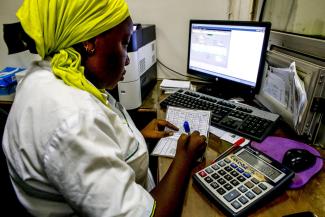Aid effectiveness
Limiting economic Corona damage

The evaluation report makes suggestions on how to counteract this economic trend, also drawing on World Bank experience. According to the report, three types of economic and social policy measures make sense:
- With liquidity injections and more generous loans, companies that are suffering from the pandemic and the lockdown can be supported.
- To help the unemployed and their families, social assistance via cash transfers is useful. Where social safety nets are still weak, they need to be expanded. In addition, government agencies can award contracts to create and secure jobs. However, such measures must be linked to compliance with sanitation measures.
- Thirdly, to further strengthen the resilience of the economy, investments should be made in the education and training of the labour force. In the medium term, this serves both the income of the employees and the productivity of the enterprises.
Typically, KfW evaluates completed projects (see interview with Jochen Kluve). However, the report also addresses new methodological concepts. These include, for example, the so-called Rigorous Impact Evaluation (RIE), which is intended to prove causal relationships, i.e. to check whether a project actually triggers the desired impact.
Rigorous evaluation
RIE is modelled on pharmaceutical research. Those who study the effectiveness of a drug need a control group that is not administered the drug in order to check whether the effects achieved in the intervention group are actually due to the drug. Participants in both groups should be as similar as possible so that the novel drug is actually the decisive variable. This is achieved by randomisation, i.e. the random assignment of test participants to each experimental group.
The RIE transfers this approach in part to the evaluation of development policies. For this, economist Esther Duflo and her colleagues Abhijit Banerjee and Michael Kremer received the Nobel Prize in Economics in 2019. KfW also evaluates projects using RIE methods. One example is a project in Burkina Faso that aims to reduce malnutrition among young children by providing their mothers with transfer payments and education in hygiene, health and nutrition.
Over three years, mothers of children between one and a half and two years old receive the cash transfers and educational opportunities, while a control group of mothers of children between two and two and a half years old do not. At the end of the period, the calorie intake of the children in both groups could be compared with the calorie intake before the project started and with each other. One result could be that the calorie intake of the children in both groups has increased, but that the children who were part of the project have a higher calorie intake than the non-participants. This would prove the positive impact of the project. Data on the situation of the women and children and their environment collected before, during and after the project phase can also be used to determine the impact of the project on other factors, such as whether there is less domestic violence.
Maren van Treel is a journalistic trainee and works for FAZIT Communication.
maren.van-treel@fazit-communication.de













